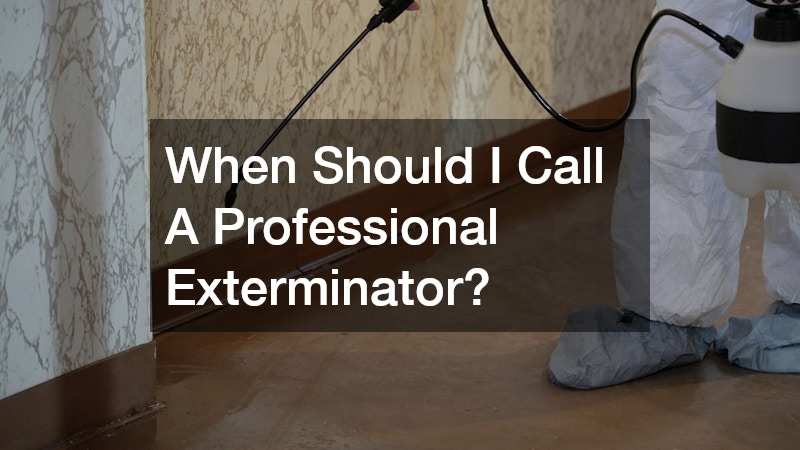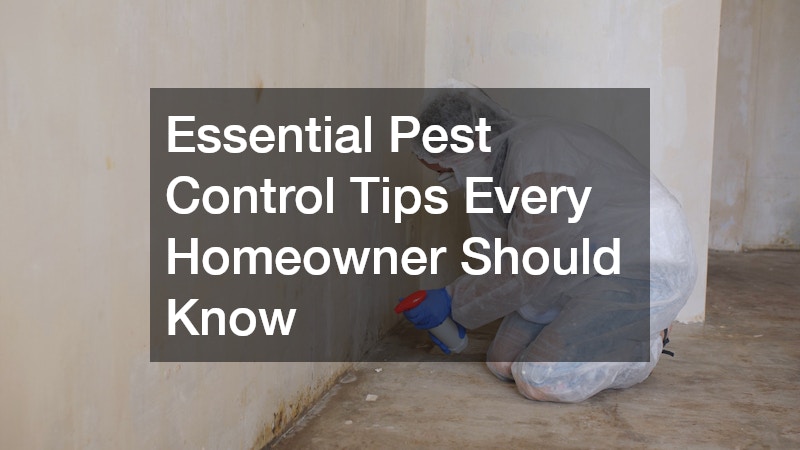Essential Pest Control Tips Every Homeowner Should Know
Maintaining a safe and comfortable home requires attention to potential pest problems. From ants in the kitchen to spiders in the garage, pests can affect both hygiene and comfort. They can also damage furniture, wiring, insulation and garden plants if left unchecked. This article provides essential pest control tips for homeowners, covering preventive measures, natural solutions, identification techniques and guidance on when to seek professional assistance. Following these strategies can reduce the likelihood of infestations and ensure a healthier, more enjoyable living environment.
How Can I Prevent A Pest Infestation?
Understanding the Importance of Home Maintenance
Regular maintenance helps keep pests away. Inspect for cracks, gaps and damp areas, and repair leaks, blocked gutters, damaged roof tiles and rotting timber. Seasonal inspections, especially after heavy rain or strong winds, are recommended.
Effective Sealing and Insulation Techniques
Sealing doors, windows and vents prevents pests from entering. Install weather stripping, mesh screens and check insulation in roof spaces and wall cavities, as these areas can shelter rodents, cockroaches or ants. For larger homes, add door sweeps and seal gaps around pipes and conduits.
Regular Cleaning and Decluttering Practices
Keeping a home clean reduces hiding places and food for pests. Vacuum, wipe surfaces, store food in sealed containers, and declutter basements, garages and wardrobes. Maintain outdoor areas by trimming grass and clearing leaves to prevent attracting pests.
What Are The Natural Pest Control Methods?
Using Essential Oils and Natural Repellents
Essential oils such as peppermint, eucalyptus and tea tree are effective natural deterrents for many household pests. Dilute oils in water and spray them around entry points, windowsills and corners. Similarly, vinegar and citrus-based solutions can discourage ants and other common insects. Regular application ensures continuous protection and reduces the chance of pests developing habits of entering the home.
Integrating Beneficial Insects in Your Garden
Certain insects can naturally control pest populations. Ladybirds, lacewings and predatory beetles feed on aphids, mites and other garden pests. Encouraging these beneficial insects in your garden reduces reliance on chemical sprays while maintaining a balanced ecosystem. Planting native flowers and avoiding broad-spectrum insecticides helps support their presence. Companion planting with herbs such as basil and mint can also deter specific pests.
Homemade Pest Traps and Solutions
Homemade traps can be a simple and effective solution for minor infestations. For example, sugar and baking soda mixtures can deter ants, while beer traps attract slugs. Sticky traps or shallow containers filled with soapy water can catch flying insects indoors. These methods are particularly useful in kitchens, bathrooms and garden areas, allowing homeowners to monitor pest activity without introducing harmful chemicals.
How Do I Identify Different Types of Pests?
Recognising Common Household Pests
Familiarity with common pests helps homeowners take timely action. Ants, cockroaches, spiders, rodents and termites are frequently encountered in Australian homes. Noting the behaviour, appearance and preferred habitats of these pests allows for targeted management strategies. Observing movement patterns, nesting locations and feeding habits can provide valuable clues for identification.
Signs and Symptoms of an Infestation
Look for droppings, chewed materials, unusual odours, shed skins or nests in corners and hidden spaces. Early detection is crucial as it prevents minor issues from escalating into larger infestations that are harder to control. Pay particular attention to damp areas, cupboards and roof spaces, which are often overlooked but highly attractive to pests.
Tools and Resources for Pest Identification
Online guides, mobile apps and local council resources can assist in identifying pests accurately. High-quality magnifying tools or cameras may be useful for closer inspection, particularly for insects that are small or difficult to distinguish. Keeping a record of sightings can also help track the effectiveness of your management strategies.
When Should I Call A Professional Exterminator?
Assessing the Severity of the Infestation
Minor pest problems can often be managed with preventive measures and natural methods. However, extensive infestations, recurring problems or structural damage caused by pests indicate the need for professional assessment. Some pests, such as termites or certain rodents, can cause significant damage if not treated promptly.
Weighing DIY Methods vs. Professional Help
While DIY methods are effective for small-scale issues, professional pest control services offer specialised knowledge, equipment and treatments. They can address hard-to-reach areas, persistent infestations and hazardous pests, ensuring long-term solutions. Professionals also provide monitoring plans that reduce the chance of recurrence.
Choosing the Right Pest Control Service
Select a service with proper licensing, good reviews and transparent practices. Ask about treatment methods, guarantees and safety precautions. A reliable provider can tailor a pest management plan that suits your property while minimising risks to people, pets and the environment. Ensure clear communication regarding costs and the expected timeline for results.
Implementing these essential pest control tips can significantly reduce the likelihood of infestations. By maintaining a well-kept home, using natural methods where appropriate, recognising signs of pests and knowing when to call professionals, homeowners can enjoy a safer, more comfortable living environment. Consistent attention to preventive practices, early detection and informed decision-making provides peace of mind and protects your home from damage.





Post Comment